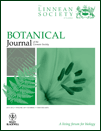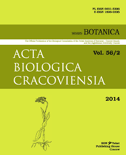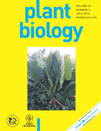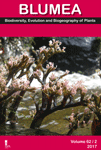
BOTANICAL JOURNAL OF THE LINNEAN SOCIETY
metrics 2024
Cultivating Insights into Plant Biology and Ecosystems
Introduction
The Botanical Journal of the Linnean Society, published by Oxford University Press, stands as a premier platform for interdisciplinary research within the realms of Ecology, Evolution, Behavior, and Plant Science. With a notable impact factor reflective of its esteemed reputation, this journal is classified in the Q1 quartile for both Ecology and Plant Science, placing it among the most influential publications in these fields. Since its inception in 1969, and with an anticipated convergence of research extending to 2024, it has become essential for scholars and professionals seeking to engage with cutting-edge studies, theoretical frameworks, and practical applications that drive our understanding of plant biology and ecological systems. The journal’s commitment to excellence is underscored by its robust Scopus rankings—achieving an impressive 83rd percentile in Ecology and a 82nd percentile in Plant Science. This makes the Botanical Journal of the Linnean Society a crucial resource for researchers, educators, and students alike, eager to advance their knowledge and contribute to the evolving discourse in botany and environmental studies.
Metrics 2024
 0.80
0.80 2.30
2.30 2.40
2.40 82
82Metrics History
Rank 2024
Scopus
IF (Web Of Science)
JCI (Web Of Science)
Quartile History
Similar Journals

PLANT SPECIES BIOLOGY
Advancing Plant Science Through Rigorous ResearchPLANT SPECIES BIOLOGY, published by WILEY in the United Kingdom, is a prominent journal dedicated to advancing the understanding of plant species, their biology, ecology, and roles within ecosystems. With an impressive convergence of research dating back to 1986 and extending through 2024, this journal caters specifically to specialists in the fields of plant science and ecology. The journal's current impact factor further underscores its significance, ranking in the Q2 quartile across three relevant categories: Ecology, Ecology, Evolution, Behavior and Systematics, and Plant Science. As a member of the Scopus ranks, it holds respectable positions within its categories, evidencing its contribution to impactful scientific discussions and knowledge. Although it is not an open-access journal, PLANT SPECIES BIOLOGY provides essential insights, fostering interdisciplinary dialogue and discovery for researchers, professionals, and students dedicated to exploring the complexities of plant species and their ecosystems.

ACTA BIOLOGICA CRACOVIENSIA SERIES BOTANICA
Fostering a deeper understanding of our botanical heritage.ACTA BIOLOGICA CRACOVIENSIA SERIES BOTANICA is a distinguished journal published by the Polska Akademia Nauk (Polish Academy of Sciences), with its roots tracing back to 1996. As a pivotal publication in the field of Plant Science, it serves to disseminate high-quality research and findings, contributing to the ongoing development and understanding of biodiversity, plant ecology, and conservation. The journal is indexed under Scopus, ranked #203 out of 516 in its category, placing it in the 60th percentile and firmly within Q3 quartile for Plant Science in 2023. Researchers, professionals, and students will find invaluable content within its pages, enhancing their knowledge and supporting academic exploration. Although it currently does not offer open access options, the journal remains a crucial resource for those engaged in botanical sciences, with a commitment to advancing scholarship in Poland and beyond.

PLANT SYSTEMATICS AND EVOLUTION
Transforming Understanding of Plant LineagesPlant Systematics and Evolution is a prestigious journal published by Springer Wien, dedicated to advancing research within the fields of plant taxonomy, evolution, and ecology. With its ISSN 0378-2697 and E-ISSN 1615-6110, this journal has been pivotal in shaping the scientific landscape since its inception in 1974. Based in Austria, it occupies a significant position in the academic community, being ranked in the Q2 quartile in both Ecology, Evolution, Behavior and Systematics and Plant Science as of 2023. This high-impact journal is recognized for its rigorous peer-review process and is indexed among the top publications in its category, holding a Scopus rank of #176 out of 516 in Plant Science and #252 out of 721 in Ecology, highlighting its relevance and quality in the research community. Although it does not currently offer open access, the journal is committed to making significant contributions to the understanding of plant biodiversity and evolutionary processes. This makes it an essential resource for researchers, professionals, and students aiming to know the latest developments in the study of plant systematics and evolution.

BRITTONIA
Unveiling Nature's Secrets: A Journey Through Plant SciencesBRITTONIA, published by Springer, stands as a reputable journal dedicated to advancing the fields of botany and plant sciences. With a storied history dating back to 1931, this journal has evolved to embrace contemporary research spanning various aspects of plant biology, ecology, and systematics. Focusing on a comprehensive analysis of both ecological interactions and plant systematics, BRITTONIA plays a crucial role in disseminating knowledge among researchers and professionals committed to understanding plant life and its environmental contexts. Despite its open access status being currently unavailable, the journal ensures wide accessibility through institutional subscriptions. In the latest rankings, it proudly holds a Q2 category in Plant Science and a Q3 category in Ecology, Evolution, Behavior, and Systematics, indicating its growing influence and academic rigor. Researchers and students alike will find BRITTONIA an essential resource for the latest findings and discussions in plant sciences.

PLANT BIOLOGY
Nurturing Insights into Ecological SignificancePLANT BIOLOGY is a prestigious academic journal published by Wiley, dedicated to advancing knowledge in the fields of plant science, ecology, and evolutionary biology. With an impressive impact factor and ranking in the Q1 category for Ecology, Evolution, Behavior and Systematics, and Plant Science as of 2023, it stands at the forefront of research dissemination. The journal encompasses a broad scope of plant biology topics, providing a critical platform for researchers to share innovative findings and foster interdisciplinary collaboration. Available in both print (ISSN: 1435-8603) and online formats (E-ISSN: 1438-8677), it ensures accessibility through open access options. As a crucial resource for professionals, researchers, and students alike, PLANT BIOLOGY cultivates a deeper understanding of plant systems and their ecological significance, making it an essential addition to the library of anyone dedicated to the study of biology and the environment.

NORDIC JOURNAL OF BOTANY
Bridging Disciplines in the World of BotanyNORDIC JOURNAL OF BOTANY, published by WILEY, is a distinguished journal that serves as a vital platform for the dissemination of innovative research in the fields of Plant Science and Ecology, Evolution, Behavior and Systematics. With an ISSN of 0107-055X and E-ISSN 1756-1051, this journal has been a crucial part of the academic landscape since its inception in 1981, continuing to contribute significantly to the literature up to 2024. NORDIC JOURNAL OF BOTANY holds a commendable Q2 ranking in Plant Science and Q3 in Ecology, which underscores its impact and relevance in the scientific community. Despite the absence of Open Access options, the journal offers robust access features that ensure researchers and readers can easily engage with its meticulously curated content. Aimed at both seasoned professionals and emerging scholars, the journal not only publishes high-quality articles but also fosters collaboration and knowledge exchange across various related disciplines, thereby solidifying its role as a cornerstone in botanical and ecological research.

ACTA SOCIETATIS BOTANICORUM POLONIAE
Exploring the Depths of Botanical Knowledge Since 1923ACTA SOCIETATIS BOTANICORUM POLONIAE is a reputable open-access journal dedicated to the field of Plant Science, published by the Polskie Towarzystwo Botaniczne since 1923. With an ISSN of 0001-6977 and an E-ISSN of 2083-9480, this journal has made significant contributions to the botanical sciences, fostering the dissemination of research from Poland and beyond. The journal has ranked in the third quartile (Q3) within its category in the 2023 journal metrics, demonstrating a strong presence in the global academic community, as evidenced by its Scopus ranking of 291/516 within the Agricultural and Biological Sciences sector, placing it in the 43rd percentile. While specific H-Index data are currently not available, ACTA continues to attract submissions from a broad international audience and publishes a wide range of studies that advance the understanding of plant biology, ecology, and conservation. The journal remains a vital resource for researchers, professionals, and students alike, committed to enhancing knowledge and collaboration in botanical science.

BLUMEA
Pioneering research in plant science and ecology.BLUMEA is a distinguished peer-reviewed journal published by RIJKSHERBARIUM in the Netherlands, specializing in Ecology, Evolution, Behavior and Systematics as well as Plant Science. With an ISSN of 0006-5196 and an E-ISSN of 0373-4293, this journal has established itself as a vital resource for academics and practitioners alike since its inception in 1993, with plans to continue through 2024. Currently holding a Q2 quartile ranking in both relevant categories, BLUMEA is positioned as a significant contributor to the advancement of knowledge in its fields, generating innovative research that informs sustainable practices and biodiversity conservation. Although it currently does not offer Open Access options, its insights are critical for those involved in plant sciences and ecological research. Positioned within the Scopus database, the journal ranks at the 41st percentile in Plant Science and the 39th percentile in Ecology, reflecting its substantial impact within the academic community. Researchers, students, and professionals who engage with BLUMEA will find it to be an indispensable source for high-quality research and valuable discussions aimed at shaping the future of ecological studies and botanical science.

Botanical Studies
Unlocking the Secrets of the Plant KingdomBotanical Studies is a premier open-access journal published by Springer, dedicated to the field of botany and plant sciences. Since its establishment in 2006, the journal has championed innovative research and scholarship that explores diverse botanical topics ranging from plant systematics to ecology and conservation. With a commitment to broad accessibility, it promotes the dissemination of knowledge to researchers, professionals, and students worldwide. Botanical Studies fosters academic collaboration and dialogue, contributing significantly to the global botanical community. Its open-access policy allows unrestricted access to its high-quality, peer-reviewed content, ensuring that vital research is available to all. Join the growing community of scholars advancing botanical science through this essential publication, conveniently located at One New York Plaza, Suite 4600, New York, NY 10004, United States.

Gorteria
Elevating Understanding of Plant LifeGorteria is a distinguished academic journal published by the Naturalis Biodiversity Center in the Netherlands, focusing on the rich field of plant science. With a publication history that spans from 1988 to 2020 and recently resuming in 2022, Gorteria serves as a critical platform for disseminating research findings, reviews, and insights in botanical studies. Although it is categorized within the Q4 quartile, it aims to elevate the understanding of plant biodiversity and ecology, playing a vital role in fostering academic discourse and encouraging the advancement of knowledge in the field. Researchers, professionals, and students will benefit from its curated content as it contributes to global biodiversity efforts and environmental sustainability. For those seeking to explore the latest discoveries in plant science, Gorteria offers a cohesive blend of rigorously reviewed articles that inform and inspire.